#environmental charity hubbub
Explore tagged Tumblr posts
Text
#virgin media 02#refugees#people in need#smartphones#donations#environmental charity hubbub#community callings#migrants#asylum seekers
5 notes
·
View notes
Text
‘Nature Hubs’ funding to transform community spaces across the UK
Over 100 grants worth over £560,000 are being awarded to community groups across the UK to help transform local areas into vibrant community green spaces.
Over 100 grants worth over £560,000 are being awarded to community groups across the UK to help transform local areas into vibrant community green spaces. The grants, awarded by environmental charity Hubbub and funded by Starbucks have been allocated to community groups and projects that aim to increase local access to green space, upskill communities, bring people together in nature and / or…
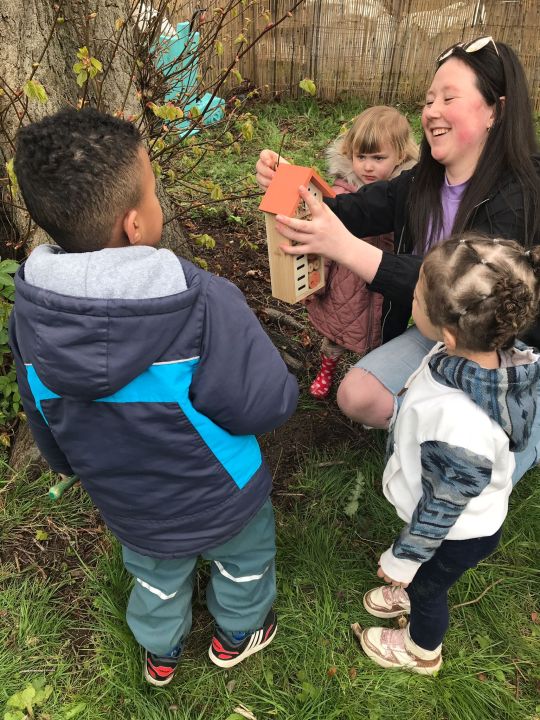
View On WordPress
0 notes
Text
Why is fashion a BIG problem for the environment?
Whether it's hats, shoes, gowns, accessories, or even a dash of glitter, how we dress and look in public is essential to many individuals. Many social media users feel pushed to keep up with the current fashion trends in order to get more followers. Some people feel that if they are seen wearing the same clothes in several pictures or posts, they will lose popularity and may even receive negative comments online. According to a recent research conducted by the environmental organisation Hubbub, one in every six young people would not wear the same clothing after seeing it on social media.

However, the fashion business has a significant environmental effect, ranking second only to the oil industry in terms of pollution. As a result, there are demands for consumers to choose more sustainable clothing choices. A new research calls on lawmakers to adopt measures that will help reduce the effect of fashion. The research, titled 'Making the UK a Global Leader in Sustainable Fashion,' was created by the charity Hubbub.It was distributed to members of the All-Party Parliamentary Group on Ethics and Sustainability in Fashion, which was formed to investigate how the government may assist the fashion sector in making reforms.
The report calls for the government to:
Allow money for more research into sustainable fabrics that have less impact on the environment
Boost the amount of recycling facilities in the UK
Support green businesses
Bring more clothing and manufacturing jobs to the UK
Educate customers about their choices when it comes to the clothes they buy.
youtube
Trewin Restorick, the CEO of Hubbub, said it was critical for the government to assist the fashion sector in changing, adding, "It's important for all of us to play our part by making individual small changes." A movement has begun that encourages individuals to perform their part by exercising "repeat dressing." When someone purposefully wears the same clothing multiple times, this is referred to as repeat dressing. It's all about encouraging others to re-wear their clothing and changing how we handle the items we wear.It is viewed as a means of combating what is known as "fast fashion." "Fast fashion refers to a model that a lot of high street shops follow," says Katie Williams of the UK Youth Climate Coalition. "It's basically that clothes should be available really quickly and really cheaply so you can get the latest trends as soon as possible and as cheaply as possible." The problem is, this way of working by the fashion industry has a bad impact on the environment.
The merchants acknowledge that more has to be done, but they say they are already striving to lessen the environmental effect of their products. Many fashion firms have stated their intention to solely use sustainable materials; for example, H&M has said that it would only use recycled and sustainably produced materials by 2030. Superdry's CEO has stated that the company's goal is to become the world's "number one listed sustainable brand." According to the British Retail Consortium, which includes small businesses, large retail chains, and department stores, clothing manufacturers are increasingly producing long-lasting items and encouraging customers to return undesired garments for reuse.
Referencing:
NewsRound. (2020). Why is fashion a BIG problem for the environment?. [Online]. BBC NewsRound. Last Updated: 23 September 2020. Available at: https://www.bbc.co.uk/newsround/54240291 [Accessed 6 November 2023].
0 notes
Text
An estimated 2,000 tonnes of plastic waste – equivalent to 83m bottles – will be generated from throwaway Halloween clothing sold by leading retailers in the UK this year research suggests.
An investigation by Hubbub, an environmental charity, into the seasonal outfits available from 19 supermarkets and retailers – including Aldi, Argos, Asos, Amazon, Boden, John Lewis, M&S, Next, and Tesco – found that 83% of the material used was polluting oil-based plastic likely to end up in landfill.
Among 324 separate textile items, the most common plastic polymer found was polyester, which accounted for 69% of all materials, while cotton made up only 10%.
...
8 notes
·
View notes
Text
How I saved money & reduced food waste during the #FoodSavvy challenge
I've been doing the #FoodSavvy challenge throughout February and it's been an eye-opener. Here's what I discovered about my habits and how to make positive changes in my kitchen...
This blog post is an ad for Environmental Charity Hubbub as a part of their Food Savvy campaign. Some items in this blog post have been gifted
I’ve been doing the #FoodSavvy challenge throughout February and it’s been an eye-opener. Firstly because I couldn’t quite believe just how much food and plastic I had been wasting before the challenge and, secondly, because I was surprised at how…
View On WordPress
1 note
·
View note
Photo
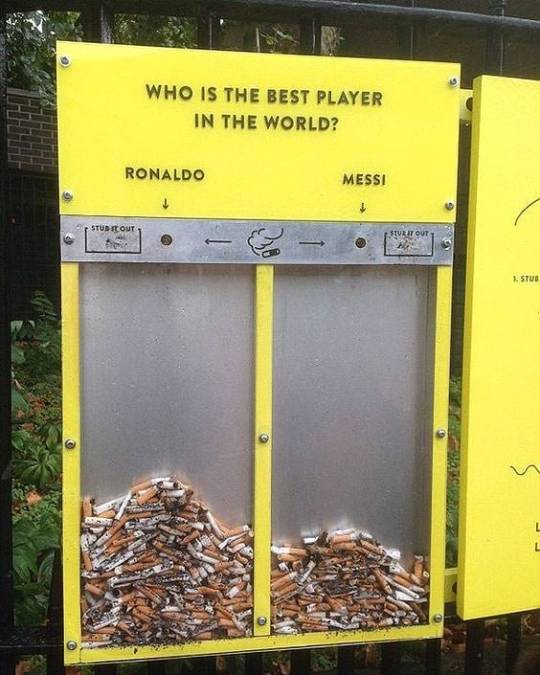
#Hubbub, an environmental charity in the UK, wants to encourage people to dispose of their #garbage in a proper manner. So it created a series of #urbantrash cans that make disposing of litter #fun. In this case, people can vote with their #cigarette butts for whom they think is the greatest #soccer player in the world: #LionelMessi or #CristianoRonaldo. The managers can also swap out the question for others that encourages debate and thus proper garbage disposal. #rifiuti #funny #cultureisfreedom #artisfreedom #curiositykilledtheblogger #artblogging #photooftheday #artaddict #artistsoninstagram #amazing #artwork #instacool #instaart #followart #artlover #sigarette #calcio https://www.instagram.com/p/BxsmtxJFr4f/?igshid=1cf52gh51zyxp
#hubbub#garbage#urbantrash#fun#cigarette#soccer#lionelmessi#cristianoronaldo#rifiuti#funny#cultureisfreedom#artisfreedom#curiositykilledtheblogger#artblogging#photooftheday#artaddict#artistsoninstagram#amazing#artwork#instacool#instaart#followart#artlover#sigarette#calcio
1 note
·
View note
Text
Market Research - Mass Consumption Amongst Gen Z
In this post I am going to do some research into the consumerist habits gen z posses to identify how it has impacted subcultures.
One of the main factors that has instigated particularly gen Zs compelling need to over consume is social media. The first thing its caused is the superficial idea that you cant post a photo wearing the same outfit more than once; over fears of embarrassment and wanting to stay trendy. According to a survey carried out by environmental charity Hubbub, one in six young people feel they can’t rewear an outfit if its been seen on social media, and 41% of people aged 18-25 feel pressured to wear a different outfit every time they go out Lisa Bowman (2017).
Social media has caused this firstly because it has given brands and influencers a platform to market and convince young people to interact with them. For example, one of the things social medias such as TikTok and instagram are oversaturated with are brand deals with young, popular influencers such as Dylan Mulvaney. These deals often include the company sending the influencer free clothing items, which they will present as a haul to their followers, praising the brand which drives people to buy the products; even though the influencer is getting paid to promote them. Not only does this encourage young people to seek out the cheapest options and engage with unethical companies such as SHEIN and Boohoo to keep up with the ever increasing speed of fast fashion, but it also speeds up the trend cycle which contributes to key fashion pieces being disconnected from their origin.

Furthermore, the fast fashion brands that are urging this sort of behaviour target their brands towards a younger audience on purpose, Prettylittlething for example. Their influencer marketing approach that utilises popular figures such as Molly Mae, attracts a younger audience simply because they make up the majority of her following. Her role as creative director in the company also shows their market how involved she is with crucial decisions within the brand, making her even more of an influence on its audience.
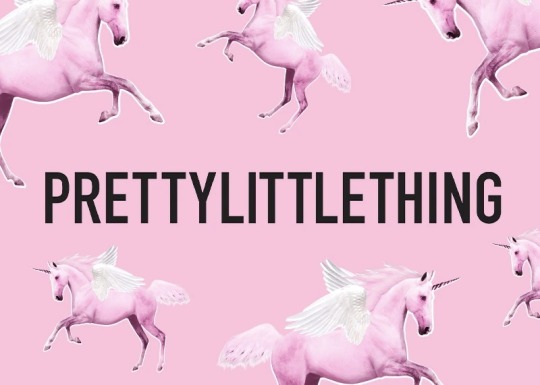
In conclusion, the over-saturation of the fashion industry caused by fast fashion corporations drives young people to buy more for less. Because of the sheer amount being purchased, things go out of style at a faster pace, which speeds up the trend cycle. Inevitably this means that items of clothing that are rooted in subculture history hold nothing more than material gain for gen Z; proving they have no knowledge on fashion origins.
0 notes
Text
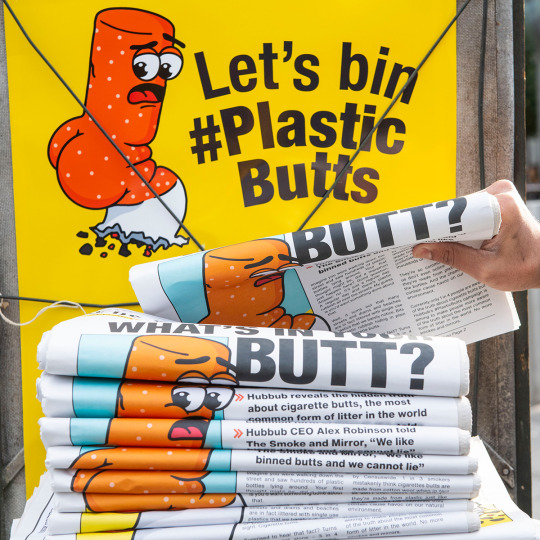
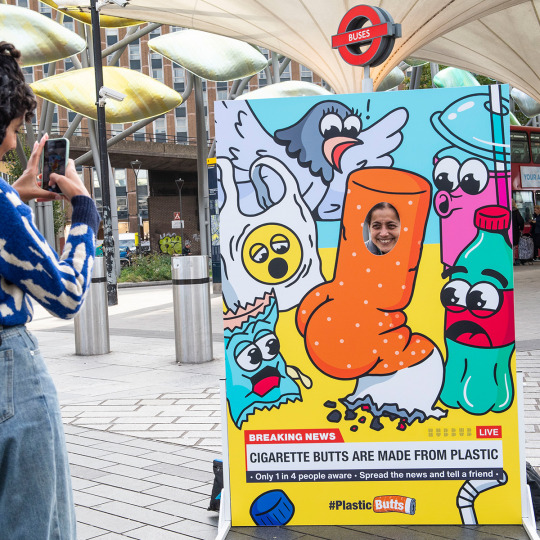
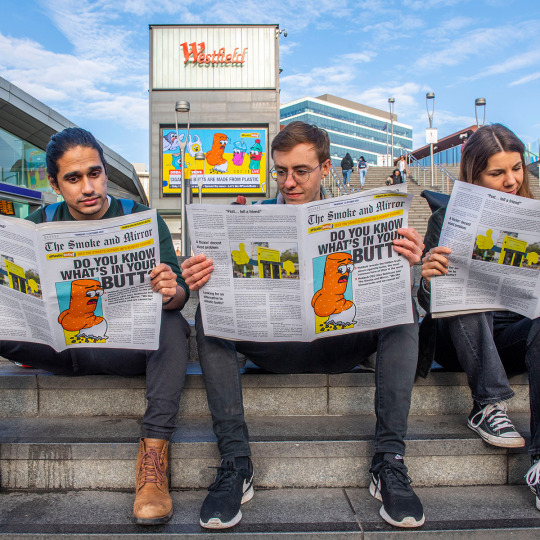
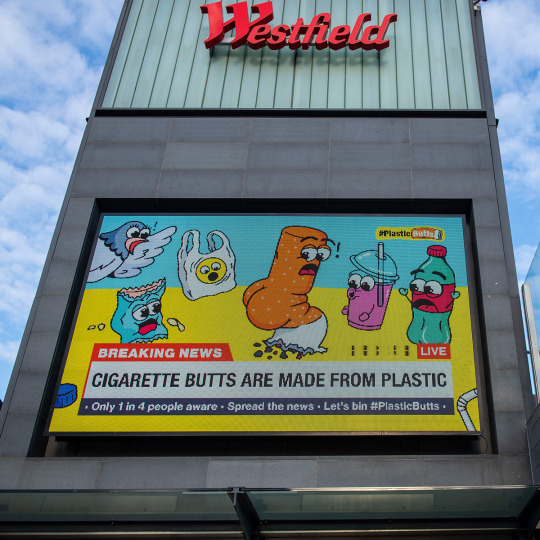
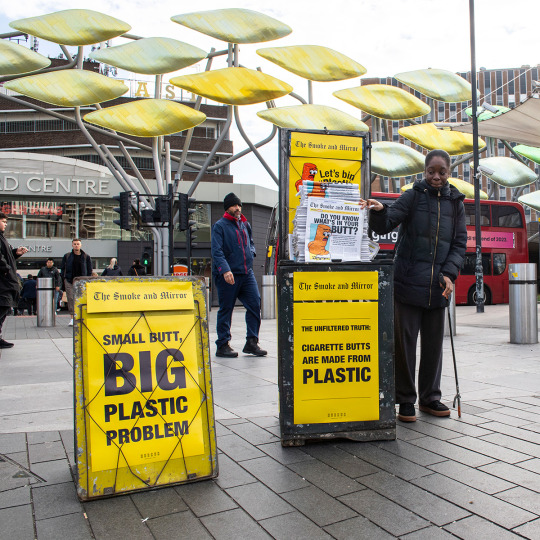

Hubbub #PlasticButts Campaign
Do you know what's in your butt? 🤔
Only 1 in 4 people currently know that cigarette butts and filters are made from plastic, and are the most littered item in the world!I worked with environmental action charity Hubbub, for their campaign to raise awareness of #PlasticButts.
The campaign launched outside one of the busiest train stations in London, with billboards, talking cigarette butts, fake newspapers, reporters, and more.
→ Read more about the campaign here.
0 notes
Text
Instagram Culture & Climate Crisis
Via Huff Post: How Instagram Culture Is Contributing To The Climate Crisis
‘One of the biggest “rules” in fashion is not duplicating an outfit. It’s so deeply embedded in our culture’s subconscious that people can still vividly recall a scene from ’00s Disney show “Lizzie McGuire” in which mean girl Kate Sanders accuses Lizzie of being an outfit repeater. Fast forward almost two decades and the insult still carries weight.
Now social media gives users unlimited potential to broadcast their lives — and increasing pressure to dress for it as well. Forty-one percent of 19- to 25-year-olds said they won’t rewear an outfit to go out in a survey from the environmental charity Hubbub. For 17%, rewearing it all was a nonstarter if they’d posted a picture of themselves in it on Instagram.
The consequences of an entire generation rapidly cycling through products and clothes — the majority of them completely non-degradable — is apocalyptic. As it stands, the fashion industry is responsible for 8% of all global carbon emissions in the world.’

0 notes
Text
New Post has been published on Qube Magazine
New Post has been published on https://www.qubeonline.co.uk/cawleys-selected-for-sip-and-separate-recycling-campaign-in-northampton/
Cawleys selected for ‘sip and separate’ recycling campaign in Northampton
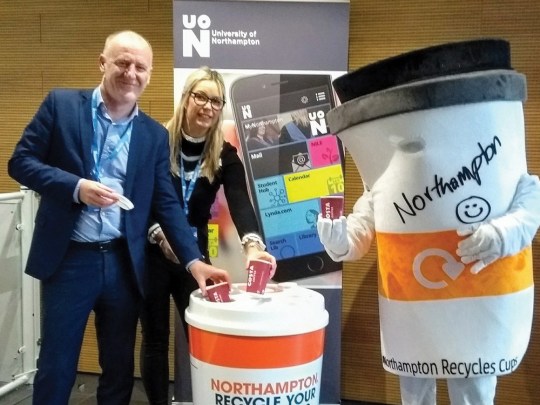
NEWS FEATURES FIRE & SECURITY SUBMISSIONS RESOURCES
Local recycling and resource management company, Cawleys, have been chosen to close the loop in Northampton’s fantastic new recycling initiative ‘Up For The Cup’.
The project is part of a bold, national environmental campaign which aims to collect and recycle as many disposable paper cups as possible.
Funded by The Cup Fund, Northampton’s ‘Up For The Cup’ initiative aims to collect and recycle over 160,000 cups in Northampton, as well as change people’s attitudes towards recycling. The Cup Fund is an initiative from environmental charity Hubbub and is the UK’s largest grant fund to bolster coffee cup recycling.
Currently only a small percentage of lined cups are recycled. This is because they need to be collected separately from other waste streams so that the special plastic lining that keeps liquids secure can be separated from the outer layer.
Only certain facilities currently carry out this process and Cawleys will play an integral role by collecting the segregated cups from the ‘Up For The Cup’ scheme and transporting them to the appropriate cup recycling centre.
Segregation is extremely important in preventing contamination and, as such, the project’s eye-catching ‘Up for the Cup’ bins have been innovatively designed to encourage consumers to ‘sip and separate’ liquids and lids from cups. The bins have been situated at strategic locations across Northampton including the University of Northampton, The Royal & Derngate Theatre and the Grosvenor Shopping centre*.
Anna Cawley, Customer Services Director at Cawleys, commented: “We are delighted to have been selected to support this fantastic initiative. We have long been advocates of improving drink-cup recycling rates and we currently collect cups at a number of clients’ premises. However, we believe that the general public need to be made more aware of the importance of segregating their cups and placing them in the correct bins – thankfully this campaign does just that.”
Project Officer, Emma Stone said of ‘Up For The Cup’: “It is great to be working with Hubbub and to see the University leading on an important environmental initiative. We have a big target to reach and really hope the public of Northampton will be ‘Up For The Cup’ with us.
“Our marketing and environmental science students are playing an integral part of the project. This provides them with a great opportunity of working on a ‘live’ socially impactful project and providing valuable experience for them whilst at university, which in turn enhances their future employability.”
Gavin Ellis, Director and Co-Founder of Hubbub, said: “While reusable cups are the most environmentally friendly choice, billions of paper cups are still being used each year and most aren’t currently recycled. We know that people generally want to do the right thing with recycling and it was surprising to find that three in four people are still unaware that cups need to be collected separately from normal card and paper.**
“By using the Hubbub and Starbucks Cup Fund to raise awareness and introduce eye-catching cup recycling points in high footfall locations, we hope we can encourage the people of Northampton to dispose of their cups in the right bins and ensure that they are recycled.”
Cawleys selected for ‘sip and separate’ recycling campaign in Northampton
NEWS FEATURES FIRE & SECURITY SUBMISSIONS RESOURCES
0 notes
Text
£25,000 grant fund to boost recycling on-the-go
Environmental charity Hubbub, supported by the trade body Natural Source Waters Association, has launched a new #InTheLoop grant fund, offering two £12,500k grants for local authorities and other interested organisations to boost out-of-home recycling in public spaces. Statistics from the Deposit Return Scheme (DRS) consultation this year showed that current recycling rates in the UK for drinks…
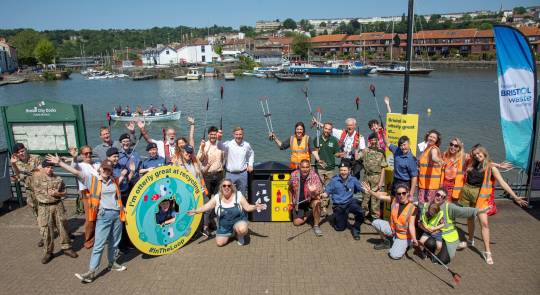
View On WordPress
0 notes
Text
The success of Hubbub
Almost six years ago, Hubbub was formed. With £25,000 and a clear set of principles, Trewin Restorick started this charity. This is an environmental charity which creates campaigns to make a difference, successfully inspiring healthier and greener lifestyle choices by producing playful and fun campaigns that are easy to get involved with. Their initial aim was to create environmental campaigns that engage with a mainstream audience, which discussed the things that people are passionate about, collaborated with organisations who shared the same ambitions, measure the impact and shared their results, and delivered a positive change.
So here are some of the differences that they have made:
Gift A Bundle
In 2016, a pilot version of the campaign called ‘Bundle of Joy’ was launched. This looked at passing on outgrown baby clothes to those who need it, and across four weeks 252 bundles and 1,500 pieces of clothing were collected. In 2017, Hubbub collaborated with Mothercare and 2,000 bundles were gifted by customers, which is about 20,000 items of clothing. In 2018, the Gift A Bundle campaign led to 2,055 bundles of clothing being gifted and 52,000 items of clothing being redistributed.
Bright Friday
In 2016, the first Bright Friday campaign took place. Instead of encouraging people to give into the Black Friday sales, Hubbub created a campaign which instead reminded people that we don’t need to purchase new clothes to feel good. Across the 2016 and 2017 campaigns, it extended the life of 639 items of clothing.
Square Mile Challenge
In 2017, bright yellow coffee cups recycling bins were installed around London, aiming to motivate people to recycle their coffee cups. In 2018, this collaborative campaign had helped to recycle just under five million cups.
Ballot Bins
In 2018, Hubbub noted that they had sold 900 cigarette Ballot Bins across the world which had helped to cut cigarette littering. They discovered that by placing playful messages on bins this persuades people to cut littering and increase recycling.
Give It A Grow
In 2019, Hubbub collaborated with the Mayor of London to make growing in cities easier, by creating a planting kit and giving away 10,000 of these to 18 collection points across London. As well as 10,000 of these kits being given out, 5,800 people signed up to the newsletter and the campaign had a reach of almost 3 million on social media.
0 notes
Link
US-headquartered coffeehouse chain Starbucks and UK environmental charity Hubbub have today launched the first-ever reusable cup trial at Gatwick Airport.
0 notes
Text
Starbucks launches reusable cups trial at U.K. airport - Mon, 10 Jun 2019 PST
Starbucks and environmental charity Hubbub are launching a trial program to lend passengers at Britain’s Gatwick Airport reusable cups while waiting for their flights in hopes of cutting down on waste. Starbucks launches reusable cups trial at U.K. airport - Mon, 10 Jun 2019 PST
0 notes
Text
In a first, Starbucks to begin trial of reusable cups at London Airport
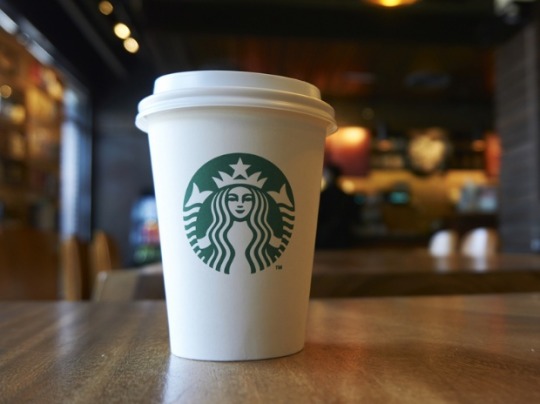
International News Starbucks Corp this month will begin a first-of-its kind trial of reusable cups at London’s Gatwick airport. People drink a lot of coffee at airports. Gatwick says it already recycles a majority of the 7 million disposable coffee cups that travelers use each year.
The airport wants to improve on that, and reusable cups potentially have a lower carbon footprint than paper cups. The funding for the airport trial grew out of a program Starbucks launched last year that added a 5 pence (6 cent) surcharge for disposable cups in UK shops.
ALSO READ : Renault's decades-long partnership with Nissan may be at boiling point
The money raised was donated to environmental charity Hubbub, which is running the program at Gatwick. "Transport hubs such as airports and railway stations are areas with a lot of footfall and not a very high use of reusable cups," said Trewin Restorick, chief executive officer and co-founder of Hubbub.
The airport is a good place to learn more about whether consumers can be incentivized to reuse cups. Starbucks locations at the airport will charge customers 5 pence for disposable cups while offering a reusable cup for free...Read more.
0 notes
Text
Starbucks’ Next Eco-Challenge (and Opportunity): Recyclable Paper Cups
Hot on the heels of Starbucks’ global decision to phase out plastic straws, the impact-conscious brand is adopting another sustainability move. On July 26, about 950 of its locations in the UK will begin charging 5p (about 7 cents U.S.) each time a customer requests a disposable paper cup, with the funds raised going to its not-for-profit partner in the project, Hubbub.
What impact does a 5p charge have on customer behaviour? See the results of the #nudge trial on coffee cups in 35 @StarbucksUK stores prepared by @hubbubUK https://t.co/nCgOXC4VwE
— Trewin Restorick (@TrewinR) July 11, 2018
Starbucks is making the move following a London test (it dubbed #nudge) with Hubbub, which saw the percentage of customers bringing their own cups increase to 5.8% from a lowly 2.2% before. As an additional incentive, Starbucks customers in the UK now receive a 25p discount if they bring in their own reusable cup.
Starbucks rolls out a 5p paper cup charge to all stores across Britain to further encourage customers to bring in a reusable cup. All proceeds will be donated to environmental charity @hubbubUK https://t.co/B3Ek9ttIm4 pic.twitter.com/1hUvahOEQ4
— Starbucks EMEA News (@StarbucksEMEA) July 10, 2018
“We saw encouraging results from the first three months of this trial with Hubbub, and what stood out to us was the positive response we had from partners (employees) and customers, who continue to push us to innovate and find ways to reduce waste,” said Starbucks EMEA head Martin Brok.
“Extending this to all our stores across Britain is an exciting step and we’re hoping this charge will remind customers to rethink their use of single-use plastic as it has with plastic bags.”
2.5 billion #coffeecups are thrown away each year in the UK, yet less than 1% are currently recycled – we find out why recycling cups isn't as easy as you'd think in this #HubbubInvestigates vlog: https://t.co/6Y6y0XoH6H #LatteLevy #plasticwaste #plastic
— Hubbub (@hubbubUK) July 11, 2018
While a 5p “latte levy” may not save the planet, consider that Starbucks is responsible for an estimated 4 billion disposable coffee cups going to landfill every year. The company is trying to develop a better cup, one that can be recycled more easily.
After a 5p charge on disposable #coffeecups successfully increased use of reusables, @StarbucksUK will expand the trial to every store in Britain! We're delighted proceeds will fund @hubbubUK activities to reduce #plasticpollution & waste https://t.co/tnDO41H6qY
— Hubbub (@hubbubUK) July 10, 2018
Earlier this week, Starbucks revealed its global plans to eliminate plastic straws, which number more than 1 billion a year at its stores, by 2020. The move follows similar initiatives by McDonald’s and smaller brands, such as Lettuce Entertain You Enterprises.
Brands are rallying around the idea of cutting non-biodegradable plastic waste in large part because so much of it ends up floating in the oceans, much of it in giant gyres that can measure hundreds of miles across. Seattle, Starbucks’ headquarters city, became one of the biggest U.S. cities to ban plastic straws, last week.
Instead of plastic straws, Starbucks is introducing two types of straw alternatives: recyclable strawless lids and an alternative-material straw option for beverages such as Frappuccinos.
It’s not just in the U.K. that Starbucks is being lobbied on recyclable paper cups. In the home of coffee, Italy—where Starbucks is opening its first store this fall—the company is feeling the heat from eco-supporters who’d like it to use recyclable cups there, too.
The post Starbucks’ Next Eco-Challenge (and Opportunity): Recyclable Paper Cups appeared first on brandchannel:.
0 notes